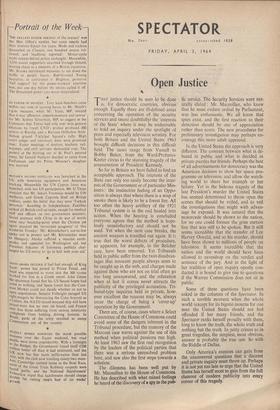Open Justice
'THAT justice should be seen to be done I 'is, for democratic countries, obvious enough. Equally there are ill-defined areas concerning the operation of the security services and (more doubtfully) the 'interests of the State' where it may be undesirable to hold an inquiry under the spotlight of press and especially television scrutiny. For both Britain and the United States 1963 brought difficult decisions in this difficult field. The cases range from Vassall to Bobby Baker, from the Ward-Profumo- Keeler circus to the stunning tragedy of the assassination of President Kennedy.
So far in Britain we have failed to find an acceptable approach. The interests of the State can only too easily become the inter- ests of the Government or of particular Min- isters : the instinctive feeling of an Oppo- sition is always that where there is a wisp of smoke there is likely to be a forest fire. All too often the heavy artillery of the 1921 Tribunal system is in the end hauled into action. When the hearing is concluded everyone. agrees that the method is hope- lessly unsatisfactory and should not be used. Yet when the next case breaks, the ancient weapon is trundled out again. It is true that the worst defects of procedure, so apparent, for example, in the Belcher case, have been removed. Yet Tribunals held in public suffer from the twin disadvan- tages that innocent people always seem to be caught up in the web, and charges made against those who are not on trial often go too long unan§wered, and the refutation when at last it comes never attracts the publicity of the privileged accusation. Tri- bunal-type inquiries held in private, how- ever excellent the reasons may be, always incur the charge of being a 'cover-up' operation by the Government.
There are, of course, cases where a Select Committee of the House of Commons could avoid some of the dangers inherent in the Tribunal procedure, but the memory of the Marconi case warns against the use of this method when political passions run high. At least 1963 saw the first real recognition by the leaders of the political parties that there was a serious unresolved problem here, and saw also the first steps towards a solution.
The dilemma has been well put by Mr. Macmillan to the House of Commons. He has described with what mixed feelings he heard of the discovery of a spy in the pub- lie service. The Security Services were nat- urally elated : Mr. Macmillan, who knew that he must endure ordeal by Parliament, was less enthusiastic. We all know that spies exist, and the first reaction to their detection should be one of appreciation rather than scorn. The new procedures for preliminary investigation may perhaps en- courage this more adult appraisal.
In the United States the approach is very different. The contrast between what is de- bated in public and what is decided in private puzzles her friends. Perhaps the best of all advertisements for democracy was the American decision to show her space pro- gramme on television, and allow the watch- ing world to share her triumph or her failure. Yet in the hideous tragedy of the late President's murder the United States has seemed determined to throw open the scenes that should be veiled, and to veil the investigations that might with advan- tage be exposed. It was natural that the motorcade should be shown to the nation, for no one could foresee the grim curtain line that was still to be spoken. But it still seems incredible that the transfer of Lee Harvey Oswald, and so his murder, should have been shown to millions of people on television. It seems incredible that the nation and the world should have been allowed to eavesdrop on the verdict and sentence of the jury. And in the light of her tradition of open inquiry openly con- ducted it is bound to give rise to questions if the Warren Commission does not sit in public.
Some of these questions have been asked in the columns of the Spectator. In such a terrible moment when the whole world (except for its bigots) mourns for one man the United States should not feel offended if her many friends, and the Spectator ranks herself proudly with them, long to know the truth, the whole truth and nothing but the truth. In petty crimes as in great tragedies, the simplest, most obvious, answer is probably the true one. So with the Riddle of Dallas.
Only America's enemies can gain from the unanswered questions that a discreet and private inquiry must throw up. Perhaps it is not yet too late to urge that the United States has herself most to gain from the full clamour of modern publicity into every corner of this tragedy.


































 Previous page
Previous page